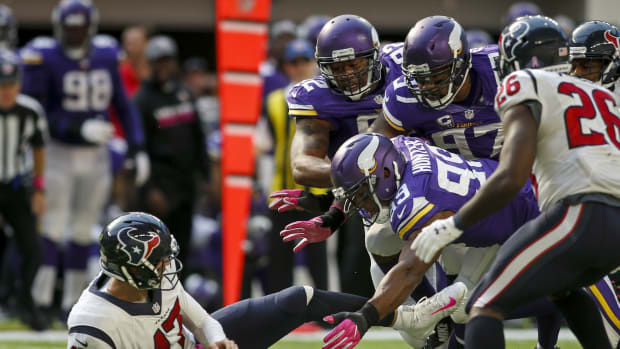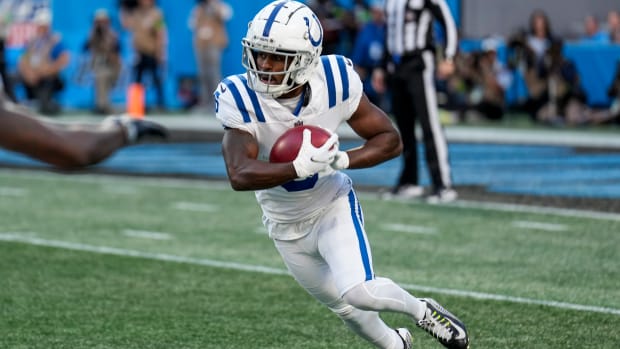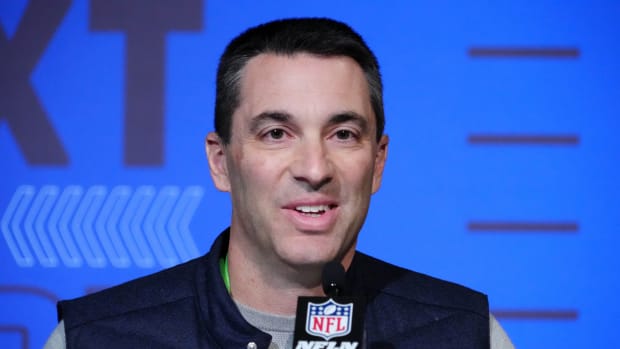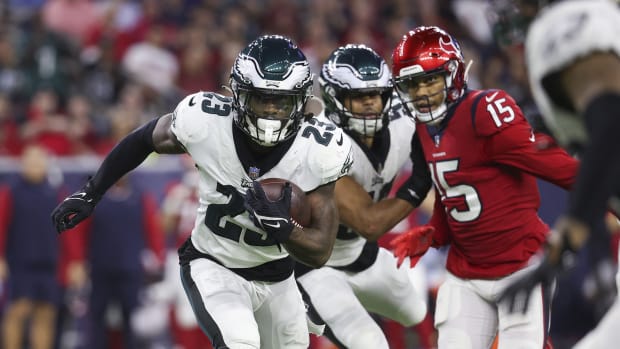NFL Teams Should Uniformly Stop Retiring Jersey Numbers
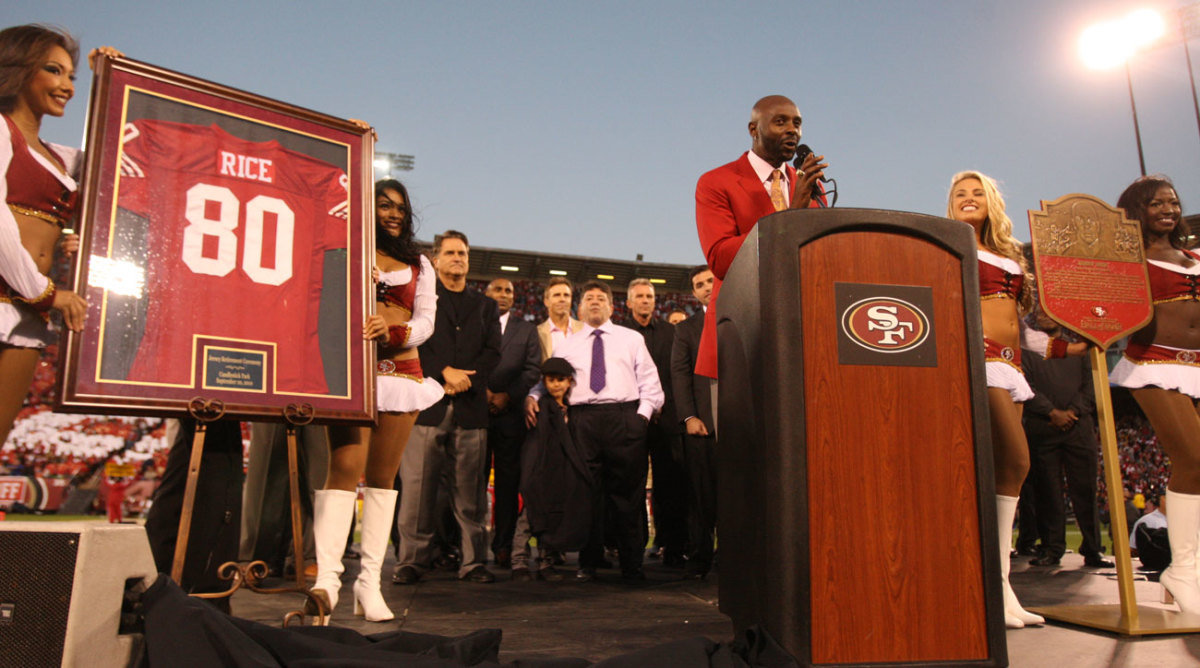
Welcome to Bad Takes Week, where MMQB staffers have been asked to expand upon some of their worst football takes. These are columns on the ideas they believe in strongly, even if it makes the rest of the room groan during our pitch meetings. Keep an eye out for more of these throughout the week.
I have a lot of bad takes. Like, some really hot bad takes. I emailed my editors three that I’d even consider unloading for Bad Takes Week while keeping a handful tucked away in my mind because they were too hot to handle.
But here’s one I’ve felt strongly about for as long as I’ve covered the league. NFL teams should have never started the tradition of retiring jersey numbers, and those that have should end the practice today and re-issue the jerseys.
You probably think this is a bad take if you’re a fan of any team that retires jersey numbers. Because I don’t have a favorite team or particular rooting interest, I don’t have much sentimentality attached to the issue. A handful of teams say they don’t “retire” jerseys, but have taken numbers out of circulation. Only the Oakland Raiders have it right: Keep every number in circulation, always.
In my opinion, the Chicago Bears bear the most blame here. They’re about to enter their 100th season and have retired 14 numbers. They retired so many, so quickly that, upon hanging up Mike Ditka’s No. 89 in 2013, the Bears announced they would do no more. (Sorry, Brian Urlacher.) In fact, of the team’s retired numbers, the player who was in the league most recently was Walter Payton, who last played in 1987. So the Bears haven’t retired a number of a player who has played in the last third of a century and still lead the league in jersey retirements.
Here are four reasons I stand behind this take:
1) There aren’t enough jersey numbers. At the risk of sounding like my colleague Andy Benoit, it’s simply practical.
The Bears, Chiefs, Giants and 49ers have each retired 10 or more jersey numbers through the first 100 years of the NFL. There will continue to be great players coming into and out of the league who will be just as worthy as those already enshrined. If you keep putting numbers on the shelf, eventually you’ll run out.
Of course, this point is based upon the league’s positional numbering system. There are only so many numbers of certain positions thanks to this system. In San Francisco, offensive linemen have to go without 70 (Charlie Krueger), 73 (Leo Nomellini) and 79 (Bob St. Clair), and I don’t know how they do it.
This isn’t an issue in other leagues, so that’s why this take is confined to football only. First of all, rosters in MLB, NBA and NHL are smaller. And while there are some restrictions on jersey numbers in those leagues, nothing is as stringent as the NFL. Go figure, right?
2) Not retiring numbers will protect you, the team, against any embarrassing episodes down the road. What happens when you take a former MVP’s number out of circulation and later he’s charged with two counts of first-degree murder? Well, you run into a situation like the debate over O.J. Simpson’s number in Buffalo last month. That’s an extreme example of course, but there are other honored players across the league who have forced their teams to reckon with their post-career behavior. If you never retired jerseys to begin with, you could re-issue the number just like any other piece of laundry.
(It’s necessary to pause here because, while this take is admittedly bad and written mostly in good fun, I recognize circumstances like the Cardinals not wanting to treat Pat Tillman’s No. 40 like any other jersey. While I do believe teams should uniformly stop retiring jerseys, I believe a work-around could be to issue numbers of significance only to players who embody what that player stood for. Just like each team has a handful of players they can select to be the team’s nominee for the Walter Payton Man of the Year award, they could just the same be up for the honor to don their team’s special number.)
3) Obviously there’s no consistency across the league, and every team currently decides its own criteria to retire numbers. But there’s not even consistency on the team level!
The Cowboys don’t have any jersey numbers officially retired, but they’ve taken 8, 12 and 22 out of circulation after they were worn by Troy Aikman, Roger Staubach and Emmitt Smith, respectively. Well what about 54, 88 and 94? Of the Giants 12 retired numbers, six of those players played before World War II but Harry Carson’s No. 53 gets to float around. How is it the Vikings have six retired numbers, and two in the 80s, but not one is Randy Moss? The Oilers/Titans have six retired numbers and not one of them belongs to Steve McNair or Eddie George.
If a team can’t be trusted to be consistent across the board, the retired-number rights must be revoked.
4) Finally, it’s not like players always abide by this fraternal code. How often do you hear about guys joining a new team and wanting (and sometimes getting) a number they can’t have?
The Broncos have three immortalized numbers, but Peyton Manning grabbed Frank Tripucka’s No. 18 when he went to Denver anyway. Rookie Dwayne Haskins muscled his way into Joe Theismann’s out-of-circulation No. 7 in Washington. Heck, Bob Avellini, the forgettable Bears quarterback before Jim McMahon, got to wear George Halas’s retired No. 7.
And thus, my argument is closed. I have presented logical and practical reasons for unilaterally retiring retired jersey numbers. If you agree, does it mean you’re on board with a bad take? Or, does it mean that this bad take has become… good?
• Question or comment? Email us at talkback@themmqb.com. We are also accepting Bad Takes from our readers. If you've got one, feel free to write it up and send it in for possible publication.

































